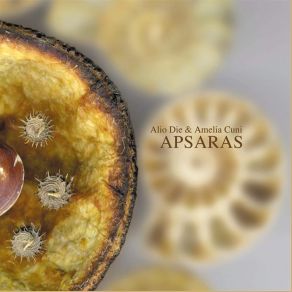Apsaras
Download links and information about Apsaras by Alio Die, Amelia Cuni. This album was released in 2001 and it belongs to Electronica, Dancefloor, Dance Pop genres. It contains 6 tracks with total duration of 58:44 minutes.

|
|
|---|---|
| Artist: | Alio Die, Amelia Cuni |
| Release date: | 2001 |
| Genre: | Electronica, Dancefloor, Dance Pop |
| Tracks: | 6 |
| Duration: | 58:44 |
| Buy it NOW at: | |
| Buy on iTunes $7.99 | |
| Buy on Amazon $8.99 | |
Tracks
[Edit]| No. | Title | Length |
|---|---|---|
| 1. | Ambhas | 5:39 |
| 2. | Island of the Rose Apple Tree | 15:26 |
| 3. | Aapaha | 6:05 |
| 4. | Water Memories | 14:01 |
| 5. | Churning of the Ocean | 5:38 |
| 6. | Apsaras | 11:55 |
Details
[Edit]Entitled after Hindi water beings dedicated to art and pleasure, Apsaras finds Die and his compatriot singer, Cuni, creating a quietly enchanting series of soft, flowing pieces that will easily please those listeners accustomed to Die's work and that of fellow travelers like Steve Roach, Robert Rich, and Vidna Obmana. Cuni herself has a collaborative streak with some fine musicians indeed — past partners include folks like Paul Schutze and Terry Riley — and on Apsaras she brings both a controlled power and deep, meditative emotion well-suited to the music. Influences can be heard from not merely Indian singing but Egyptian and Arabic vocal styles, extended croons and cries just smoothed out enough to match the ethereal — sometimes to the point of near-complete silence — work of Die. "Island of the Rose Apple Tree," which takes up a quarter of Apsaras' length, demonstrates the value of their collaboration well; with a core rhythm based around very, very slow bass tones and soft, bell-like echoes, Die sets the stage for Cuni's marvelous lead. Ranging from barely detectable low registers to stronger but never overwhelming turns — in keeping with the flow of the album as a whole, everything she sings sounds like it's coming across a distant sea, mysterious and strange — it's a tour de force performance. "Water Memories" is equally as impressive and lengthy, a slightly more energetic flow and wash of electronic textures and a recurrent sitar loop that Cuni again serenely rides through and above, at one point suddenly coming through at her loudest and clearest. Water sounds and atmospheres are unsurprisingly heavily featured throughout Apsaras, and while it's a new age trope almost as much as power chords are for rock & roll, Die's use of it fits the music well.